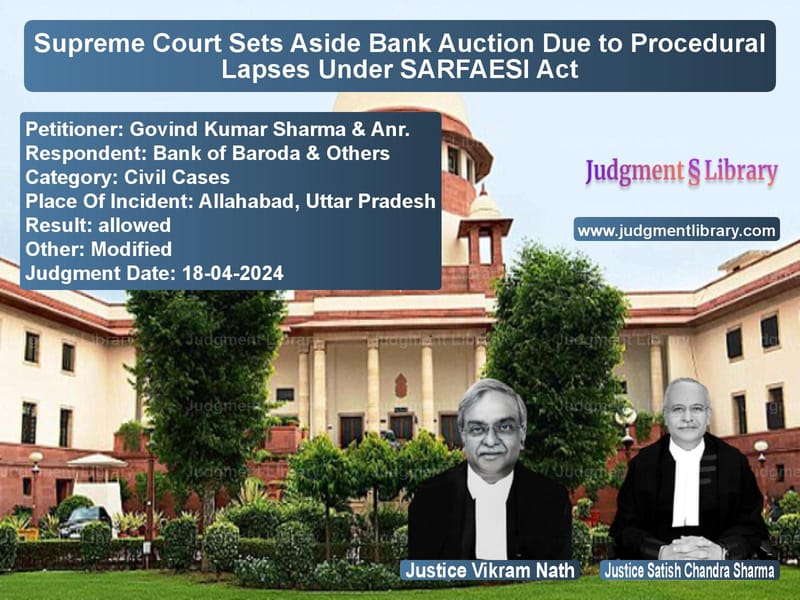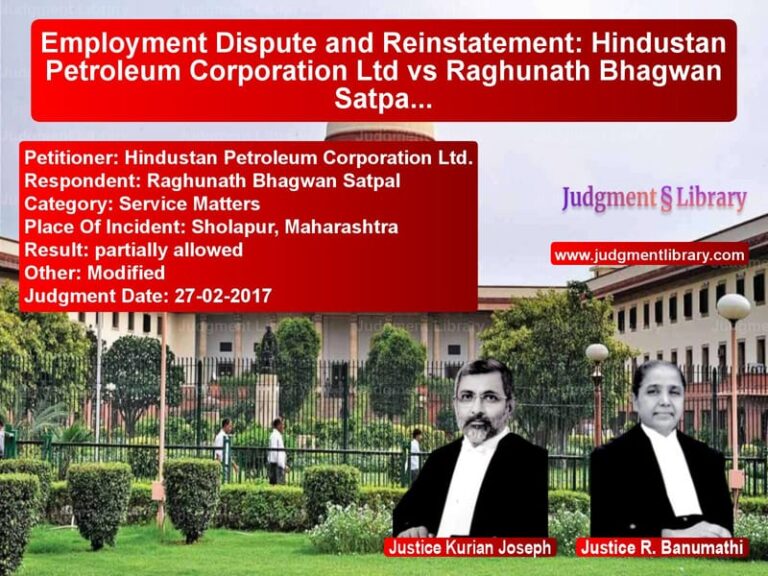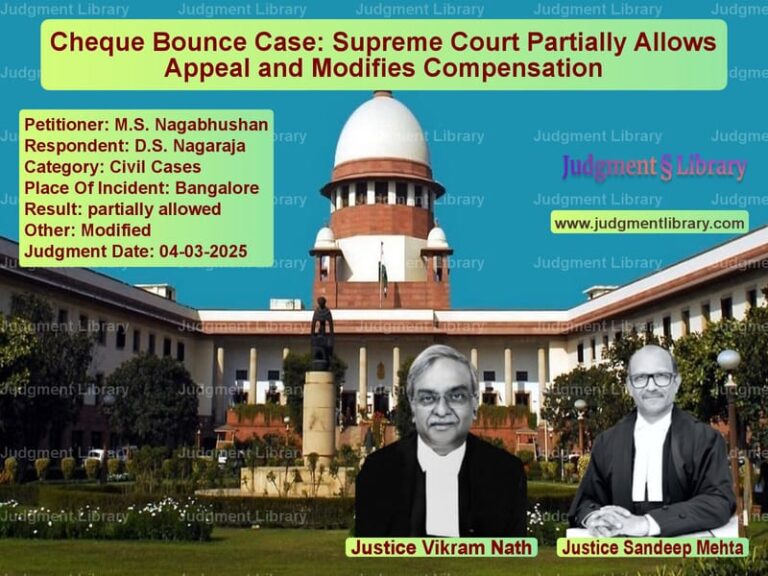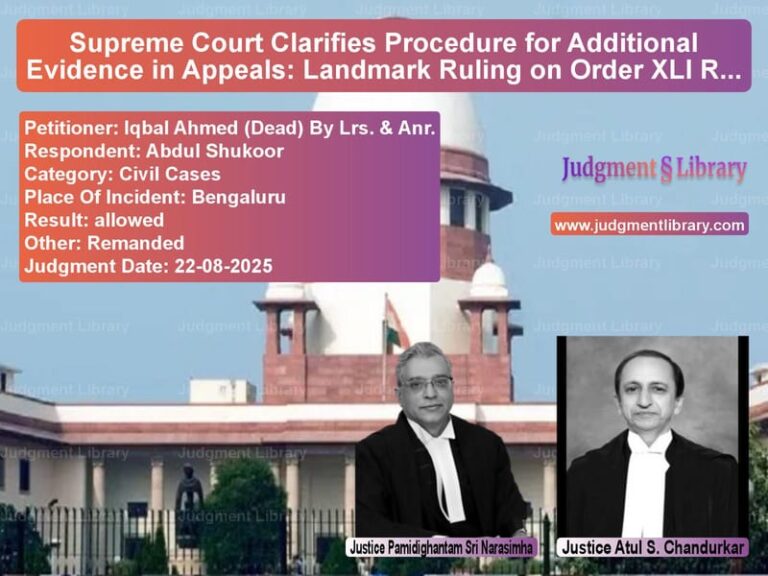Supreme Court Sets Aside Bank Auction Due to Procedural Lapses Under SARFAESI Act
The case of Govind Kumar Sharma & Anr. vs. Bank of Baroda & Others revolves around a disputed auction sale conducted under the Securitisation and Reconstruction of Financial Assets and Enforcement of Security Interest Act, 2002 (SARFAESI Act). The Supreme Court was tasked with determining whether the sale was valid given that the bank failed to adhere to the mandatory notice requirements prescribed under the SARFAESI Act and the Security Interest (Enforcement) Rules, 2002.
The Court ruled in favor of the appellants, setting aside the sale and directing the bank to refund the auction money with compounded interest, thereby upholding the principle that statutory compliance is mandatory in debt recovery proceedings.
Background of the Case
The dispute arose when the Bank of Baroda initiated proceedings under the SARFAESI Act to recover outstanding dues from the borrower, M/s Ram Charan Industries. The property in question was put up for auction, and the appellants, Govind Kumar Sharma and another, emerged as the highest bidders. Their bid was accepted, and they duly deposited the auction amount. A sale certificate was issued to them on March 30, 2009.
However, the borrowers contested the sale, filing a securitization application under Section 17 of the SARFAESI Act before the Debt Recovery Tribunal (DRT). They argued that the bank had failed to serve the mandatory 30-day notice before the auction, as required under Rules 8(6) and 8(7) of the Security Interest (Enforcement) Rules, 2002. The DRT ruled in favor of the borrowers and set aside the sale. This decision was upheld by the Debt Recovery Appellate Tribunal (DRAT) and later by the Allahabad High Court, prompting the appellants to approach the Supreme Court.
Key Legal Issues
- Whether the auction sale was valid despite the bank’s failure to issue a mandatory 30-day notice.
- Whether the appellants, as bona fide purchasers, had any legal claim to retain ownership of the property.
- Whether the appellants were entitled to compensation for improvements made to the auctioned property.
Arguments by the Appellants
The appellants contended:
“We were bona fide purchasers who participated in the auction in good faith. We deposited the full amount as required and have made significant investments in improving the property.”
They further argued that since they had acquired legal ownership through the auction, their rights should not be set aside due to the bank’s procedural lapses.
Arguments by the Respondents
The bank acknowledged its failure to issue the required notice but argued:
“While the notice requirement was not followed strictly, the borrowers were aware of the proceedings, and the sale should not be invalidated.”
On the other hand, the borrowers contended:
“The auction sale was illegal from the outset due to non-compliance with the SARFAESI Act. The bank cannot transfer ownership of a property through a sale that was itself invalid.”
They also stated that they had already repaid the bank’s outstanding dues, making the auction unnecessary.
Supreme Court’s Analysis
1. Importance of Compliance with SARFAESI Rules
The Court examined the provisions of the SARFAESI Act and held:
“The mandatory nature of the 30-day notice under Rule 8(6) and Rule 8(7) ensures transparency in the auction process and protects the rights of borrowers.”
Since the bank admitted non-compliance, the Court ruled that the auction was legally unsustainable.
2. Rights of Bona Fide Auction Purchasers
The appellants claimed that they should be entitled to retain ownership as they were bona fide purchasers. However, the Court rejected this argument, stating:
“An auction purchaser’s rights cannot override the fundamental requirement of a legally conducted sale.”
The Court emphasized that since the auction itself was illegal, no valid title could be conferred upon the appellants.
3. Compensation for Improvements Made
The appellants sought compensation for investments made in improving the property. The Court held:
“Improvements made by the auction purchaser do not create any legal entitlement to retain ownership when the sale itself was void ab initio.”
However, the Court acknowledged that the appellants had held possession of the property since 2009 and should be compensated fairly.
Final Judgment
The Supreme Court upheld the decisions of the DRT, DRAT, and High Court, ruling:
“The auction sale is set aside due to non-compliance with statutory requirements. The appellants shall be refunded the auction amount with compound interest at 12% per annum.”
The Court further directed the bank to issue a “No Dues Certificate” to the borrowers upon settlement of accounts.
Key Takeaways from the Judgment
- Banks must strictly comply with notice requirements under the SARFAESI Act before conducting auctions.
- An auction sale conducted in violation of statutory requirements is void, even if a bona fide purchaser is involved.
- Purchasers of auctioned properties must verify procedural compliance to avoid legal complications.
- Courts will order refund of auction money with interest if a sale is set aside due to procedural lapses.
- Borrowers who repay their dues are entitled to reclaim their property, provided the auction was conducted improperly.
Judgment Date: April 18, 2024
Judges: Vikram Nath, Satish Chandra Sharma
Petitioner Name: Govind Kumar Sharma & Anr..Respondent Name: Bank of Baroda & Others.Judgment By: Justice Vikram Nath, Justice Satish Chandra Sharma.Place Of Incident: Allahabad, Uttar Pradesh.Judgment Date: 18-04-2024.
Don’t miss out on the full details! Download the complete judgment in PDF format below and gain valuable insights instantly!
Download Judgment: govind-kumar-sharma-vs-bank-of-baroda-&-oth-supreme-court-of-india-judgment-dated-18-04-2024.pdf
Directly Download Judgment: Directly download this Judgment
See all petitions in Property Disputes
See all petitions in Debt Recovery
See all petitions in Banking Regulations
See all petitions in Judgment by Vikram Nath
See all petitions in Judgment by Satish Chandra Sharma
See all petitions in allowed
See all petitions in Modified
See all petitions in supreme court of India judgments April 2024
See all petitions in 2024 judgments
See all posts in Civil Cases Category
See all allowed petitions in Civil Cases Category
See all Dismissed petitions in Civil Cases Category
See all partially allowed petitions in Civil Cases Category







